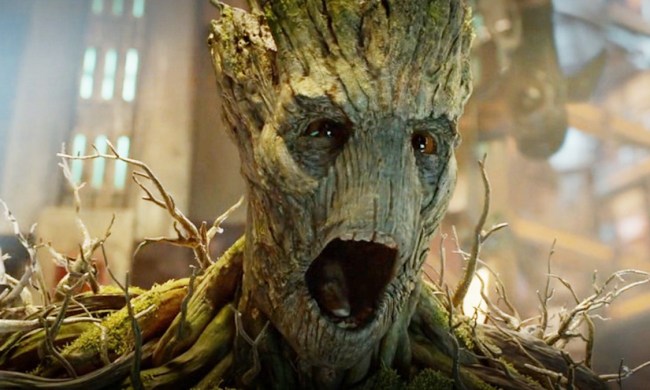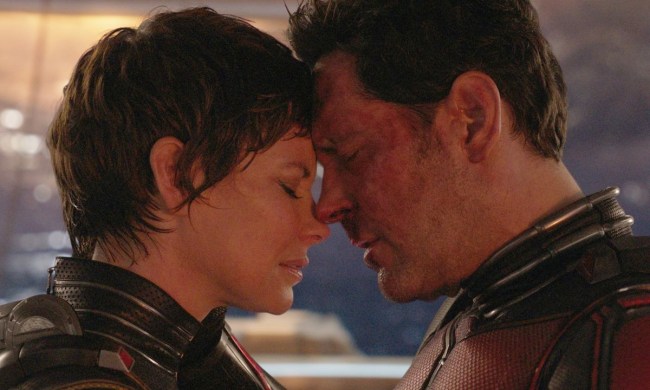
Marvel’s cinematic universe has already expanded beyond the big screen, and it’s only getting bigger.
After a presentation at last week’s CineEurope event in Barcelona, Marvel Studios President Kevin Feige took some questions from attendees that covered a wide range of subjects and projects on Marvel’s horizon — from the upcoming Guardians of the Galaxy to Doctor Strange, Ant-Man, and even the possibility of studio crossovers with the X-Men and Spider-Man at some point.
Asked whether Marvel is looking to turn Guardians of the Galaxy into another franchise in the mold of Iron Man, Captain America, or its other, Avengers-related series, Feige stopped short of confirming a plan for sequels, reports TotalFilm.
“Every time we make a movie, we focus on the single movie, the importance of doing the best version we can to introduce a new audience to the characters,” he explained. “So we don’t have, necessarily, two or three or four movies planned because if we have a good idea — a fun idea for a scene or a cool character — we put it in this movie because we know if the first movie doesn’t work, there won’t be any movies after that.”
Still, he indicated that the long histories of both the team and the characters in the film offer lots of source material for future adventures if the opportunity for sequels presents itself.
As for Thanos, the villain who appeared in a credits sequences at the end of The Avengers and continues to lurk in the background of Marvel’s cinematic universe, Feige said audiences will learn more about him in Guardians of the Galaxy, and that he is “the biggest piece of connective tissue that will eventually lead us back into Avengers films in the future.”
Feiege also addressed the last few, tumultuous weeks of news regarding the Ant-Man movie, and reaffirmed that the film will hit theaters July 17, 2015, as originally planned. Feiege said that, despite the change in directors from Edgar Wright to Peyton Reed and the addition of writer Adam McKay, the movie still draws heavily from the script penned by Wright and his collaborator, Joe Cornish. According to Feige, McKay was brought in to rework parts of the script, not the entire draft.
“Ant-Man is a very important character for us,” he added. “We like that people don’t necessarily know what it is, we like that it sounds sort of strange when you first hear the notion of Ant-Man, or a hero that can shrink, but he’s a very key Marvel character: He’s a key Avenger.”
It’s worth noting that Feige referred to Ant-Man as a “key Avenger,” so there’s certainly some fodder for speculation there.
Feige also teased that the search for an actor to lead Marvel’s upcoming Doctor Strange movie may be over soon, with casting “probably in the next month or two” and production expected to begin next spring.
“Doctor Strange is a character that I’ve been interested in for many, many years and that I’ve talked about in interviews for probably 14 years, because I believe it’s very, very important for us to explore every nook and cranny of the comic-book universe,” said Feige. “We’ve done the street-level heroes, and we’ve done the billionaire superheroes [on Earth]. We’ve now done the cosmic side with Thor and Avengers and most obviously with Guardians, but there’s a whole other side of the Marvel comics, which is that supernatural side — the interdimensional side of the Marvel universe, and Doctor Strange is, I believe, our entry point into that other realm, which has dozens of characters and storylines all of its own.”
“So Strange is very, very important, not just because it’s an amazing character study, and a journey of a man who’s gone from this very arrogant surgeon to somebody who is quite zen and literally keeps all of reality together on a daily basis, but it also is going to open up a whole other side of storytelling for our movies,” he added.
As for the upcoming batch of interconnected Netflix miniseries that begin with Daredevil and lead into the team-up event The Defenders, Feige reiterated that the series is a part of the company’s greater cinematic universe.
“I think the television division first and foremost need to make great TV shows that stand on their own,” he said. “But because it is Marvel, we do think they will all fall under the umbrella of the Cinematic Universe, the way Marvel’s Agents Of S.H.I.E.L.D. does now, the way the Agent Carter series will, so I do think that Daredevil and Jessica Jones and the other ones [Iron Fist and Luke Cage] will have a loose connection to the overall storyline.”
Finally, Feige expressed some doubt that audiences will ever see The Avengers share a screen with the X-Men or Spider-Man, citing the success of 20th Century Fox and Sony Pictures with their respective Marvel properties.
“It would be great, I think, to be able to have all of the Marvel characters interact one day, in a single movie with Marvel Studios, [but] I don’t think that’ll happen anytime soon,” he said. “Fox is doing very well. Days Of Future Past just came out, was a big hit, [and] was a very, very good movie. As long as they keep doing that they’ll be able to keep those rights. Sony — same thing — has very long term plans for Spidey, and I think as long as they keep doing that and as long as they keep succeeding, Sony will have Spidey for a long time. So I wouldn’t say anything’s impossible, I’ve been at Marvel for almost 14 years now, and it’s a very different company today than when it was a near bankrupt company just trying to get a foothold in movies when I started. So I always say nothing is impossible but I’m not sure that’s going to happen any time soon.”



